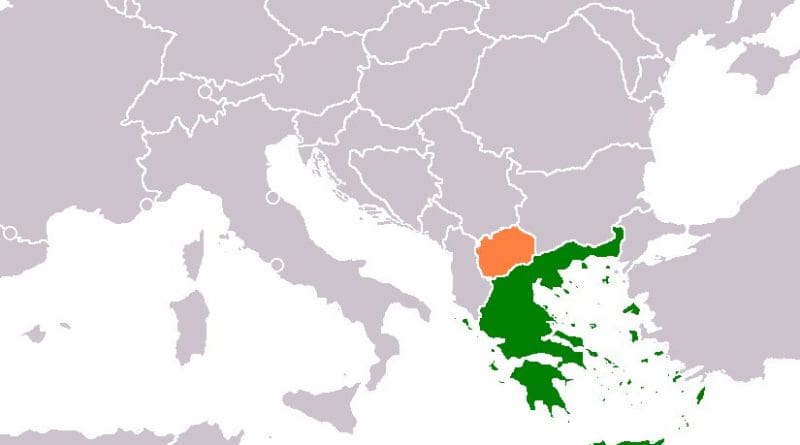Greece: MPs Approve Historic Macedonia ‘Name’ Agreement
By Sinisa Jakov Marusic
NATO and EU leaders have applauded Greece’s parliament for approving the historic agreement with neighbouring Macedonia, following days of heated debate and clashes in the streets.
Greece’s parliament on Friday backed ratification of the highly
controversial agreement that is designed to end the decades-long dispute
over Macedonia’s name.
In the vote that ended at 14.30 pm local
time, 153 MPs from the ruling parties and from some opposition parties
in the 300-seat parliament endorsed the agreement, which Macedonia has
already adopted.
A total of 146 MPs voted against it.
Greek ratification marks the final act of the “Prespa” agreement’s
implementation, after Macedonia on January 11 altered its constitution,
allowing the country’s name to be changed from Republic of Macedonia to
Republic of North Macedonia.
In exchange for changing its name,
to which Greece objected, Greece has agreed to lift its blockade on
Macedonia’s NATO and EU accession bids.
Macedonian Prime Minister Zoran Zaev expressed his delight. “Congratulations my friend [Alexis] Tsipras. Together with our peoples we reached a historical victory. Long live the Prespa Agreement! For eternal peace and progress of the Balkans and in Europe!” Zaev wrote on Twitter.
Macedonia’s Foreign Minister, Nikola Dimitrov, said hope had triumphed over fear.
“Courage and hope have defeated fear. The future is there. As Nikos [Kotzias, former Greek foreign minister] often says, history should be a teacher, not a prison. I am so proud of what we did. Long live our friendship and the friendship between our nations! Long live visionary patriotism!” Dimitrov wrote on Twitter.
EU enlargement commissioner Johannes Hahn called the agreement “a historic breakthrough for the two countries, the region and Europe as a whole. I applaud the leaders on both sides for their courage and vision!”
“They had imagination, they took the risk, they were ready to sacrifice their own interests for the greater good. Zoran [Zaev], Alexis [Tsipras]– well done! Mission impossible accomplished”, European Council President Donald Tusk wrote on Twitter.
NATO chief Jens Stoltenberg tweeted that ratification of the deal in Greece was “an important contribution to the stability and prosperity of the whole region. I look forward to the future Republic of North Macedonia joining NATO.”
In a joint statement, the European Parliament’s Foreign Affairs Committee Chair David McAllister and EP rapporteur for Macedonia Ivo Vajgl also praised the achievement.
“We commend the immense statesmanship, determination and political courage of the leaders and confirmed by the parliaments of both countries. Unblocking a seemingly unresolvable dispute has taken intensive diplomatic efforts and the compromise would not have been possible without the support and responsibility shown by political and civic actors across the two countries,” they wrote.
Ratification of the deal in Athens is an important victory for the Greek Prime Minister. “We are one step before an historic event,” Tsipras told parliament on Thursday, one day before the vote.
Tsipras said that the previous failures to solve the long-standing dispute had deprived Greece of precious diplomatic capital, and he accused the conservative opposition New Democracy party, which opposed the agreement, of being hypocritical.
New Democracy leader Kyriakos Mitsotakis told parliament before the
vote on Thursday that the deal was a “national defeat” and a “minefield”
that once ratified would be impossible to scrap and difficult to amend.
He added that if he is elected Prime Minister, he would retain the right to block Macedonia’s EU accession at any time.
Before
the vote, Independent Greeks leader Panos Kammenos, who quit the ruling
coalition earlier this month over his disagreement with the name deal,
accused Tsipras of seeking to break up his party. A handful of former
members of Kammenos’s party, as expected, provided crucial support for
approving the deal.
During the three-day parliamentary debate leading up to the vote, the tense atmosphere spilled onto the streets.
On Thursday night, thousands of opponents to the name deal gathered in Athens to protest and smaller clashes with the police were reported in front of the parliament.
In one incident, a group of protesters spray-painted “Macedonia is a
Greek Land” outside the home of US Ambassador Geoffrey Pyatt in Athens,
the police said.
In another incident in Katerini in Northern
Greece, on Thursday night, three police officers were injured and 11
protesters were detained in a scuffle at a police cordon that was
preventing a mob from reaching the home of the ruling coalition MP
Elisavet Skoufa.
After ratifying the deal, parliament in Athens is expected soon to approve Macedonia’s NATO membership bid under its new name.
If this happens, Greece will be the first NATO member state to make such a move, in a process that is expected to pass other national parliaments during this year, resulting in Macedonia becoming a NATO member.
Western countries and the US lobbied strongly for the compromise deal, hoping to see an end to one of the region’s most arcane, disruptive and long-standing disputes.
The quarrel dates back to Macedonia’s independence from the former Yugoslavia in 1991. Greece promptly objected to the former Yugoslav republic’s name, insisting that the word Macedonia formed part of Hellenic heritage, and insisting that its use implied a territorial pretension to the Greek province of the same name.
Years of mediation failed to achieve any result until Greece’s Tsipras and Macedonia’s new centre-left leader Zoran Zaev agreed a compromise solution signed last June on the banks of Lake Prespa, which divides the two countries.

